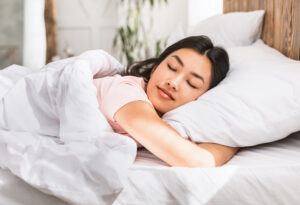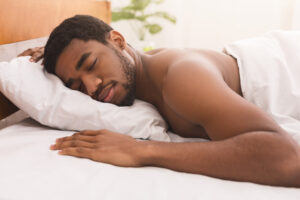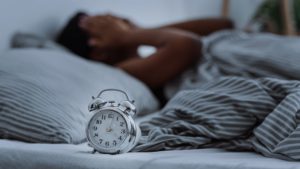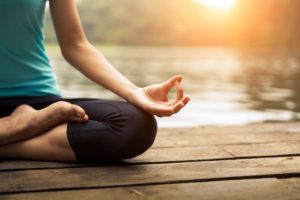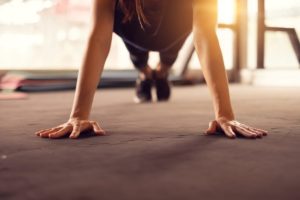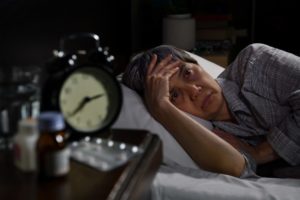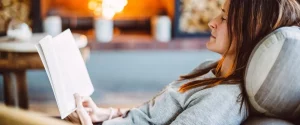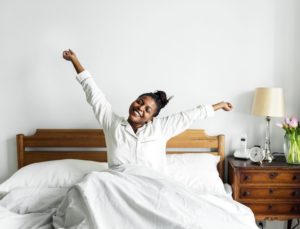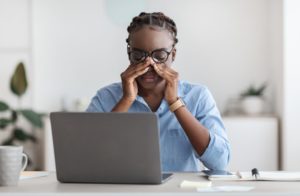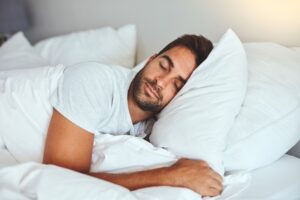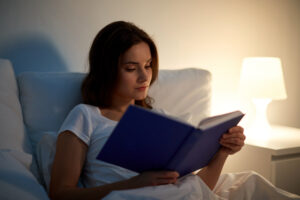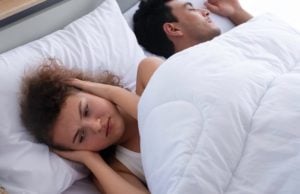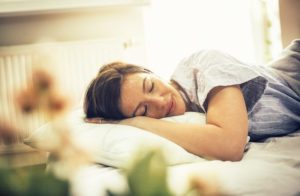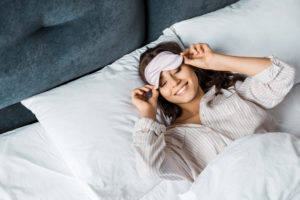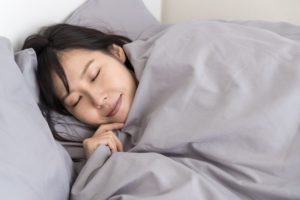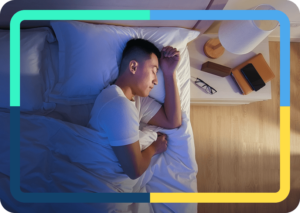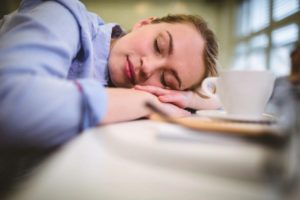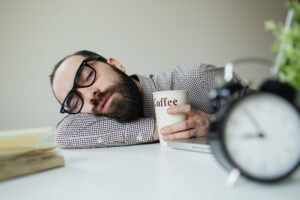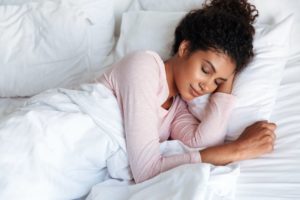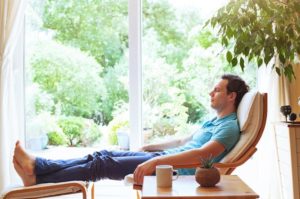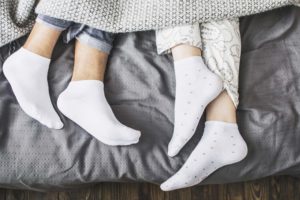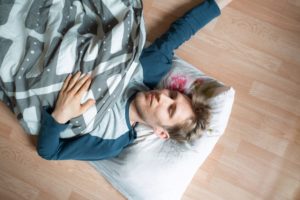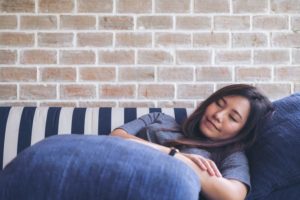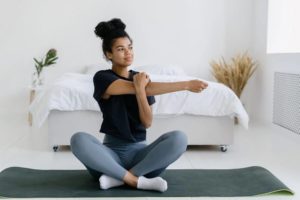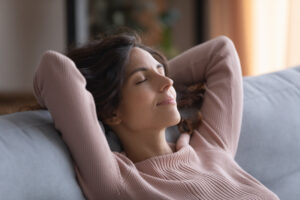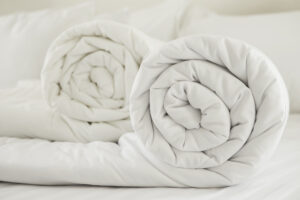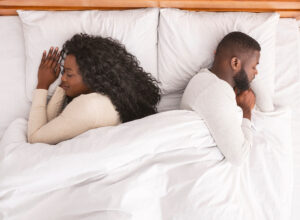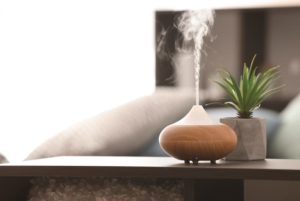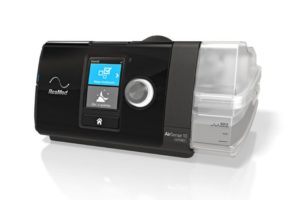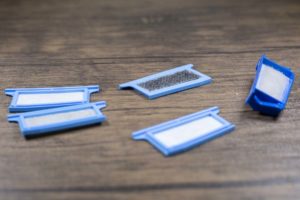When you buy through our links, we may earn a commission. Products or services may be offered by an affiliated entity. Learn more.
Showering Before Bed
For many people, an evening shower feels like a natural end to the day. This nightly habit may affect your body temperature and, as a result, your sleep quality.
Body temperature plays an important role in the sleep-wake cycle, and human bodies naturally experience a decrease in core body temperature before nightly sleep. Scientists have found that by impacting this natural temperature regulation process, showers and baths can affect sleep. We will take a look at the benefits of showering before bed, and examine whether a hot or cold shower is better for sleep.
Benefits of Showering Before Bed
When incorporated into a bedtime routine, a nighttime shower may help send your brain the signal that it is time to sleep. Showering at night also ensures you will be cleaner when you go to bed, reducing the buildup of sweat, dirt, and body oils on your bedding.
Additionally, research suggests showering before bed might provide other benefits. These benefits vary, depending on whether you take a hot or cold shower.
Looking to improve your sleep? Try upgrading your mattress.
Effects of Hot Showers on Sleep
A growing body of research suggests that taking a hot shower or bath before bed can improve sleep. In the hours before bedtime, a human’s core body temperature naturally cools, while skin temperatures of the hands and feet increase. Scientists hypothesize that immersing the body in warm water aids this natural temperature regulation process, improving sleep as a result. Researchers have dubbed this phenomenon the “warm bath effect.”
Research lends credibility to the warm bath effect. A meta-analysis of 17 studies found that taking an evening shower or bath in water between 104 and 108.5 degrees Fahrenheit improves sleep quality. Those who bathe or shower one to two hours before bedtime also fall asleep faster. The researchers theorize that warm water stimulates blood flow to the hands and feet, which allows body heat to escape more quickly. A recent study of older adults also found that taking a hot bath one to three hours before bedtime helped them fall asleep faster.
“Make sure your warm shower is at least one hour before bed, because that is what is best supported by research. This habit can be part of additional changes to your bedtime routine, like stopping harmful sleep habits, including screen time, and starting helpful ones.”
Dr. David Rosen, Sleep Physican
A warm bath or shower before bed might do more than just improve sleep. In a study of older adults, a bath between about 104.5 and 106 degrees Fahrenheit lowered blood pressure before and during sleep.
Some people also take a hot shower before bed when experiencing a cold, since inhaling warm steam is a popular home remedy used to reduce nasal congestion. Current evidence does not support the benefits of steam for nasal congestion, but you may want to try this method to see if you find relief.
Effects of Cold Showers on Sleep
Researchers have tried to leverage cold showers to optimize body temperature for sleep, with mixed results. One study found that athletes who immerse themselves in cold water for ten minutes after evening exercise experience a drop in core body temperature, fewer nighttime arousals, and a greater proportion of deep sleep within the first three hours of sleep.
Not all cold shower research has been as promising. Another study found that being immersed in cold water after evening exercise raises core body temperature at first, then leads to a lower core body temperature four to five hours later. This decrease in body temperature does not appear to affect sleep quality, however. Participants in the study also experienced an increased heart rate. A similar study of youth soccer players found that cold water immersion after an evening training session did not affect sleep.
Cold showers might not improve sleep because of cold water’s stimulating properties. Cold water immersion raises levels of cortisol and norepinephrine. Cortisol is involved in boosting alertness levels, and consequently, cortisol levels in the body usually fall in preparation for sleep. In one study, participants compared the energy boost of a cold shower to the effects of drinking caffeine.
That said, bathing in cold water might provide benefits unrelated to sleep. Athletes sometimes use cold water in an attempt to reduce muscle soreness and fatigue. Anecdotally, people claim cold showers boost mood and optimize blood flow for healthier skin and hair, though not all of these benefits have been scientifically demonstrated.
Hot vs. Cold Showers: Which One Is Better for Sleep?
More research demonstrates that warm or hot showers in the evening improve sleep. However, athletes may find that cold showers help reduce muscle stiffness, which may contribute to better sleep by reducing discomfort.
If you are going to take a shower at night to promote sleep, you might want to consider taking a warm shower instead of one that is steaming hot. Research shows that hot water may cause more dramatic changes to blood pressure in older adults.
Researchers are still working to pinpoint what time frame is best for a pre-bedtime shower. Most evidence seems to indicate that taking a shower one to two hours before bedtime gives the body enough time to reach the right temperature for sleep.

Still have questions? Ask our community!
Join our Sleep Care Community — a trusted hub of sleep health professionals, product specialists, and people just like you. Whether you need expert sleep advice for your insomnia or you’re searching for the perfect mattress, we’ve got you covered. Get personalized guidance from the experts who know sleep best.
References
11 Sources
-
Haghayegh, S., Khoshnevis, S., Smolensky, M. H., Diller, K. R., & Castriotta, R. J. (2019). Before-bedtime passive body heating by warm shower or bath to improve sleep: A systematic review and meta-analysis. Sleep Medicine Reviews, 46, 124–135.
https://pubmed.ncbi.nlm.nih.gov/31102877/ -
Tai, Y., Obayashi, K., Yamagami, Y., Yoshimoto, K., Kurumatani, N., Nishio, K., & Saeki, K. (2021). Hot-water bathing before bedtime and shorter sleep onset latency are accompanied by a higher distal-proximal skin temperature gradient in older adults. Journal of Clinical Sleep Medicine: JCSM: Official Publication of the American Academy of Sleep Medicine, 17(6), 1257–1266.
https://pubmed.ncbi.nlm.nih.gov/33645499/ -
Tai, Y., Saeki, K., Yamagami, Y., Yoshimoto, K., Kurumatani, N., Nishio, K., & Obayashi, K. (2019). Association between timing of hot water bathing before bedtime and night-/sleep-time blood pressure and dipping in the elderly: A longitudinal analysis for repeated measurements in home settings. Chronobiology International, 36(12), 1714–1722.
https://pubmed.ncbi.nlm.nih.gov/31610699/ -
Singh, M., Singh, M., Jaiswal, N., & Chauhan, A. (2017). Heated, humidified air for the common cold. The Cochrane Database of Systematic Reviews, 8(8), CD001728.
https://pubmed.ncbi.nlm.nih.gov/28849871/ -
Chauvineau, M., Pasquier, F., Guyot, V., Aloulou, A., & Nedelec, M. (2021). Effect of the depth of cold water immersion on sleep architecture and recovery among well-trained male endurance runners. Frontiers in Sports and Active Living, 3, 659990.
https://pubmed.ncbi.nlm.nih.gov/33870188/ -
Robey, E., Dawson, B., Halson, S., Gregson, W., King, S., Goodman, C., & Eastwood, P. (2013). Effect of evening postexercise cold water immersion on subsequent sleep. Medicine and Science in Sports and Exercise, 45(7), 1394–1402.
https://pubmed.ncbi.nlm.nih.gov/23377833/ -
Robey, E., Dawson, B., Halson, S., Gregson, W., Goodman, C., & Eastwood, P. (2014). Sleep quantity and quality in elite youth soccer players: A pilot study. European Journal of Sport Science, 14(5), 410–417.
https://pubmed.ncbi.nlm.nih.gov/24093813/ -
Buijze, G. A., Sierevelt, I. N., van der Heijden, B. C. J. M., Dijkgraaf, M. G., & Frings-Dresen, M. H. W. (2016). The effect of cold showering on health and work: A randomized controlled trial. PLOS ONE, 11(9), e0161749.
https://pubmed.ncbi.nlm.nih.gov/27631616/ -
Hirotsu, C., Tufik, S., & Andersen, M. L. (2015). Interactions between sleep, stress, and metabolism: From physiological to pathological conditions. Sleep Science (São Paulo, Brazil), 8(3), 143–152.
https://pubmed.ncbi.nlm.nih.gov/26779321/ -
Gaab, J. (2021, February 4). Feasibility and effects of taking cold showers: A randomized controlled study. ClinicalTrials.Gov.
https://clinicaltrials.gov/ct2/show/NCT04130126 -
Ono, J., Hashiguchi, N., Sawatari, H., Ohkusa, T., Miyazono, M., Son, S. Y., Magota, C., Tochihara, Y., & Chishaki, A. (2017). Effect of water bath temperature on physiological parameters and subjective sensation in older people. Geriatrics & Gerontology International, 17(11), 2164–2170.
https://pubmed.ncbi.nlm.nih.gov/28421715/



